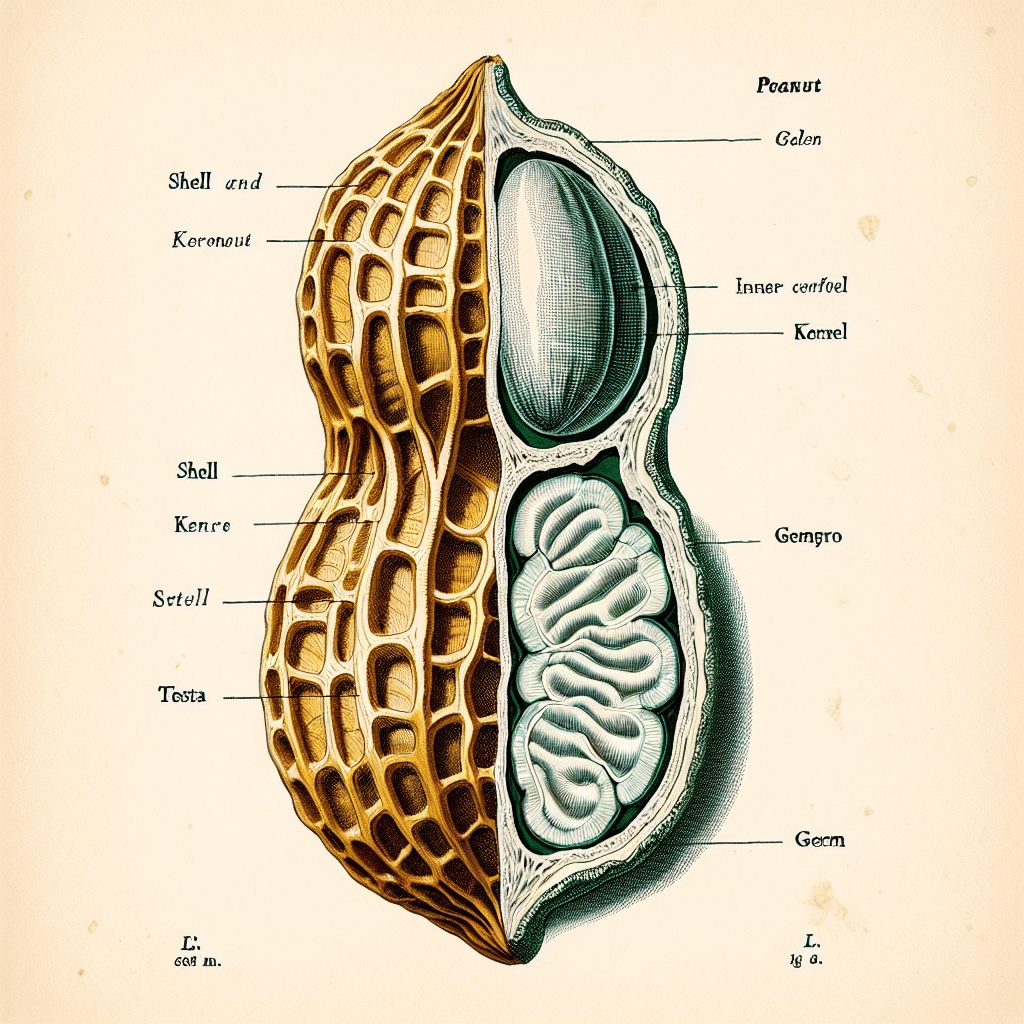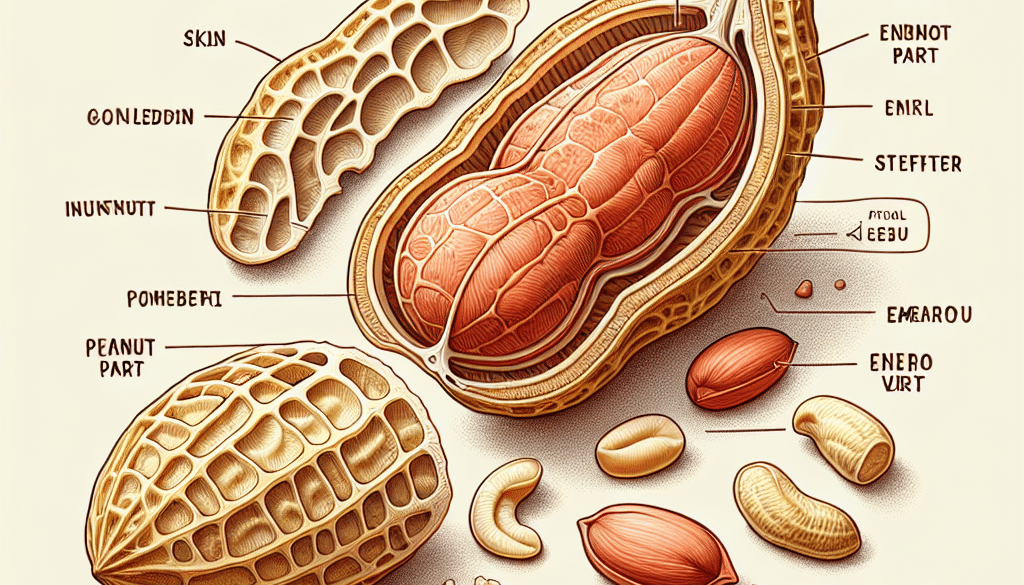Anatomy of a Peanut: Inside the Shell
-
Table of Contents
- Anatomy of a Peanut: Unveiling the Hidden Complexities
- Understanding the Peanut Plant
- The Peanut Lifecycle: From Flower to Harvest
- Dissecting the Peanut: A Closer Look Inside the Shell
- Nutritional Profile of Peanuts
- Health Benefits and Risks
- Peanuts in Agriculture and Economy
- Conclusion: The Multifaceted Peanut
- Discover ETprotein’s High-Quality Peanut Protein Products
Anatomy of a Peanut: Unveiling the Hidden Complexities

Peanuts, often mistaken as nuts, are actually legumes that have intrigued scientists and food enthusiasts alike with their unique structure and nutritional benefits. This article delves into the anatomy of a peanut, exploring the intricate details hidden within its shell. We will dissect the components of a peanut, understand its developmental stages, and highlight its nutritional profile, providing a comprehensive look at this popular snack and ingredient.
Understanding the Peanut Plant
Before we crack open the shell, it’s essential to understand the plant that produces this fascinating legume. The peanut, or Arachis hypogaea, is a member of the Fabaceae family and is primarily cultivated in tropical and subtropical regions around the world. The plant itself is quite unique, as it flowers above ground but fruits below the soil surface.
The Peanut Lifecycle: From Flower to Harvest
The lifecycle of a peanut plant is a remarkable journey. It begins with a delicate yellow flower that, after pollination, undergoes a process called “geocarpy.” This is where the flower’s ovary elongates and grows downward, burying itself in the soil where the peanut will develop. This fascinating reproductive strategy is what sets peanuts apart from other legumes.
Dissecting the Peanut: A Closer Look Inside the Shell
Once harvested, the peanut reveals its true structure. Encased in a fibrous shell, the peanut is not a single entity but rather a pod containing multiple kernels. Here’s what you’ll find when you take a closer look:
- The Shell: The outer layer of the peanut, known as the shell or hull, is made of cellulose and provides protection to the kernels inside. It varies in thickness and can be either smooth or textured.
- The Kernels: Typically, a peanut pod contains one to four kernels. Each kernel is encased in a thin, papery skin called the testa, which can be red, brown, or pink, depending on the peanut variety.
- The Cotyledons: The bulk of the kernel is made up of two halves called cotyledons. These are the “meat” of the peanut, rich in nutrients and the source of peanut butter.
- The Embryo: Nestled between the cotyledons is the embryo, which contains the genetic material to grow a new peanut plant. The embryo consists of a radicle (embryonic root) and a plumule (embryonic shoot).
Nutritional Profile of Peanuts
Peanuts are not only fascinating in structure but also in their nutritional makeup. They are a rich source of protein, healthy fats, vitamins, and minerals. Here’s a breakdown of the key nutritional components:
- Proteins: Peanuts are an excellent source of plant-based protein, essential for muscle repair and growth.
- Fats: The majority of fats in peanuts are monounsaturated and polyunsaturated, which are beneficial for heart health.
- Vitamins: Peanuts contain vitamins like niacin, folate, and vitamin E, which play vital roles in energy metabolism and antioxidant protection.
- Minerals: Essential minerals such as magnesium, phosphorus, and potassium are abundant in peanuts, contributing to bone health and other physiological functions.
Health Benefits and Risks
Consuming peanuts can offer numerous health benefits, including reduced risk of heart disease, weight management, and control of blood sugar levels. However, peanuts can also pose risks, particularly for individuals with peanut allergies, which can be severe and life-threatening.
Peanuts in Agriculture and Economy
The cultivation of peanuts plays a significant role in agriculture and economies worldwide. Countries like China, India, and the United States are leading producers, contributing to both local and global markets. The peanut industry supports millions of jobs, from farming to processing and distribution.
Conclusion: The Multifaceted Peanut
In conclusion, the anatomy of a peanut is a testament to nature’s ingenuity. From its unique reproductive process to its complex structure and impressive nutritional profile, peanuts are more than just a snack—they’re a superfood with a rich history and significant economic impact. Understanding the anatomy of a peanut provides valuable insights into the world of plant biology and nutrition.
Discover ETprotein’s High-Quality Peanut Protein Products
If you’re looking for a reliable source of plant-based protein, ETprotein offers a range of products derived from peanuts and other plant sources. Their peanut protein is characterized by a neutral taste, non-GMO, and allergen-free attributes, making it an excellent choice for various applications in the food and beverage industry.
About ETprotein:
ETprotein, a reputable protein Chinese factory manufacturer and supplier, is renowned for producing, stocking, exporting, and delivering the highest quality organic bulk vegan protein and plant proteins. They include Organic rice protein, clear rice protein, pea protein, clear pea protein, pumpkin seed protein, sunflower seed protein, mung bean protein, peanut protein etc. Their offerings, characterized by a neutral taste, non-GMO, allergen-free attributes, cater to a diverse range of industries. They serve nutraceutical, pharmaceutical, cosmeceutical, veterinary, as well as food and beverage finished product distributors, traders, and manufacturers across Europe, USA, Canada, Australia, Thailand, Japan, Korea, Brazil, and Chile, among others.
ETprotein specialization includes exporting and delivering tailor-made protein powder and finished nutritional supplements. Their extensive product range covers sectors like Food and Beverage, Sports Nutrition, Weight Management, Dietary Supplements, Health and Wellness Products, and Infant Formula, ensuring comprehensive solutions to meet all your protein needs.
As a trusted company by leading global food and beverage brands and Fortune 500 companies, ETprotein reinforces China’s reputation in the global arena. For more information or to sample their products, please contact them and email sales(at)ETprotein.com today.












